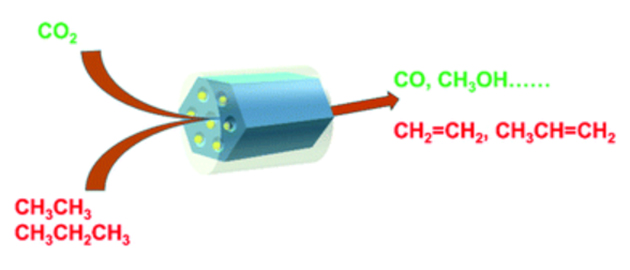Abstract
Oxidative dehydrogenation of light alkanes in the presence of carbon dioxide (CO2) via heterogeneous catalysis is a sustainable approach. Compared with the strong O-2 oxidant, CO2 is soft and controllable for the transformation of light alkanes, affording an attractive and environmentally friendly route. Using this catalytic process, light alkanes can be converted to corresponding olefins and CO2 is transformed into value-added chemicals. Herein, we provide a critical review on the current development of the CO2 assisted transformation of light alkanes. Also, different types of catalysts are discussed in this critical review: (i) metal oxide catalysts based on Cr, Ga, In, Fe and other metals oxides; (ii) metallic and bimetallic precious and non-precious catalysts; and (iii) carbide and nitride catalysts. A detailed review of the literatures consists of the nature of active sites and the role of modifiers and supports for each type of catalytic material. The catalytic performance of these different types of catalysts for the dehydrogenation of light alkanes is discussed in the absence and presence of CO2. Finally, we present perspectives for future progress in this field.

KeyWords Plus:N-BUTANE OXIDATION; SELECTIVE OXIDATION; PROPANE DEHYDROGENATION; EFFICIENT CATALYST; LIGHT ALKANES; METAL-OXIDE; CO2 REDUCTION; SOFT OXIDANT; ETHANE; ETHYLENE
Published in GREEN CHEMISTRY;Volume 23,10.1039/d0gc03705b,JAN 21 2021


